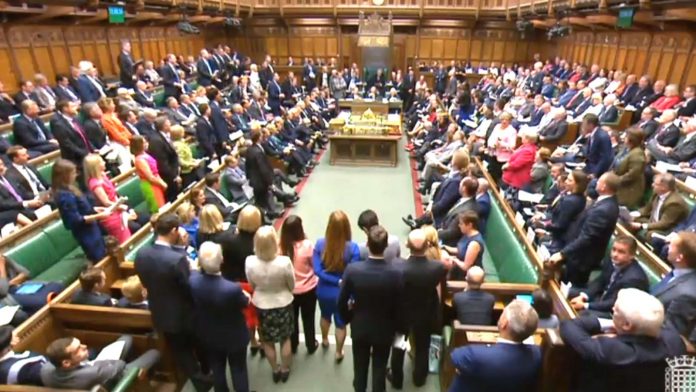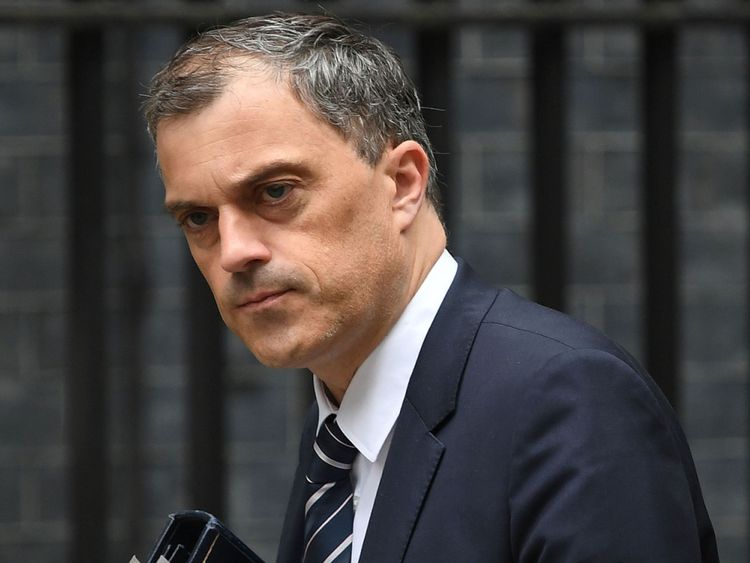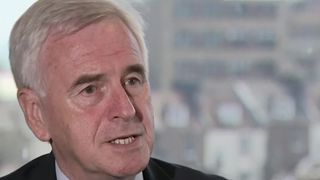[ad_1]
Theresa May’s deputy has told MPs the “pairing” breach which has led to demands for government chief whip Julian Smith to resign or be sacked will not happen again.
But the row, after Tory chairman Brandon Lewis voted when he was paired with the Lib Dems’ Jo Swinson while she was on maternity leave, was not the first time this has happened.
Answering an urgent question in the House Commons on Monday, Cabinet Office minister David Lidington told MPs: “I can assure the House again that the errors of last week will not be repeated.”
But that was a bold claim.
The notorious Michael Heseltine mace-swinging incident in 1976 and Labour’s decision to stop pairing in 1996 both followed similar rows and allegations of cheating.
Tom Pendry, who was a whip in James Callaghan’s government in 1976, contacted Sky News to say he set the precedent when he cast a decisive vote on the Aircraft and Shipping Bill when he was believed to be paired.
In his memoirs, “Taking It On The Chin”, ex-boxer Lord Pendry tells with wit and colour what happened on that famous night and how Callaghan was forced to agree to a demand from Opposition leader Margaret Thatcher to re-run the disputed vote.
More than 40 years later, after Mr Lidington’s Commons statement, shadow Commons leader Valerie Vaz and Labour backbencher and former whip Conor McGinn both mentioned the 1976 re-run and called for a replay of last week’s Brexit vote.
Describing what happened in 1976, Lord Pendry writes: “With only a few minutes left before the next and vital vote, I discovered that one of our ministers, Fred Peart, who had been counted as eligible to vote, had gone abroad on parliamentary business believing he was paired.
“Armed with that news, I made it to the aye lobby just in time to vote as the doors slammed behind me. The result was 304 to 303 and the government won by my vote!”
After recalling how Labour MPs sang “The Red Flag” in the Commons and Michael Heseltine “picked up the Commons mace and with both hands swung it in the direction of the government benches”, Lord Pendry tells how he was summoned to see Callaghan.
Then there are hilarious tales of how the prime minister sent for Peart’s parliamentary private secretary (PPS), George “Geordie” Grant, who was in parliament’s Strangers’ Bar “the worse for wear” and then phoned Peart, who was “in a similar state to his PPS” in a Copenhagen hotel.
After Mrs Thatcher called off all co-operation on Commons business, Callaghan promised an inquiry and told MPs in a Commons statement that they “recognised that there was a sense of grievance about the vote”.
Pendry describes how the inquiry “found that there were some misunderstandings about the pairing and voting arrangements”.
Sound familiar? It does sound similar to the government’s responses to the Lewis-Swinson dispute of the past week.
In 1996, Derek Conway, who was MP for Edward Heath’s old seat of Old Bexley and Sidcup until he was forced to quit in an expenses scandal in 2008, was the Conservative “pairing” whip, responsible for pairing up sick or absent Tory MPs.
Mr Conway provoked another huge voting row by pairing three Tory MPs with three Labour members and three Liberal Democrats simultaneously.
“I said it was an innocent mistake at the time and I stand by that,” he told Sky News.
The move enabled John Major’s government to win a very tight vote on fisheries.
But, the late Donald Dewar claimed Mr Conway was guilty of blatant cheating and duplicity and broke off pairing, as Thatcher had 20 years earlier.
What all three rows – 1976, 1996 and 2018 – have in common is that the government of the day, those of Callaghan, Major and now Theresa May had – and has – no Commons majority.
So while the present government – or if a future government – has no majority, Mr Lidington’s claim that allegations of cheating in Commons votes won’t happen again are difficult to believe.
[ad_2]










